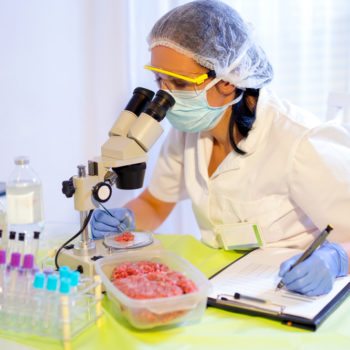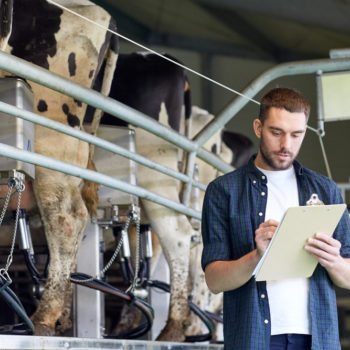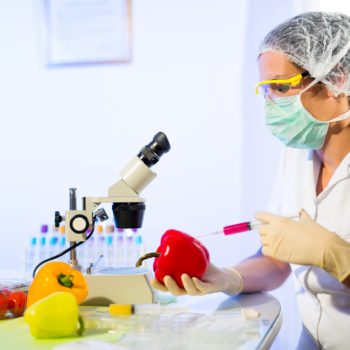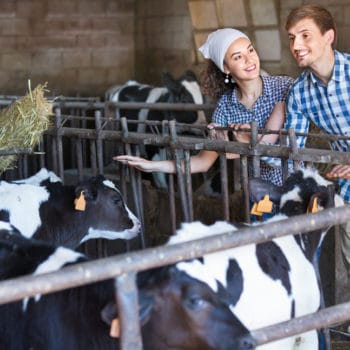Why We Love It
-
$77,860Potential Avg. Salary
-
2.6%Job Growth Rate
-
Growing DemandJob Outlook
-
Don't Take Work HomeCareer Attribute
A food or agricultural chemist is a scientific expert who aims to produce food with nutritional value and feed, to support the population in a way that is sustainable and viable, keeping in mind the surrounding environment and ecosystem.
Recommended Schools
What is a Food or Agricultural Chemist?
Duties
As a food or agricultural chemist, you are expected to deliver on the following tasks effectively:
- Coordinate with research professionals from other areas like biochemists, biologists, toxicologists, etc. on improving chemical compositions for protecting and producing optimal crops or livestock.
- Find ways to develop and implement solutions to bio-chemical reactions, both cause and effect, pertaining to plant and animal growth
- Create reports and work on products influenced by key findings of research
- Advise professionals on technical issues, while also contributing to the purchase and sale of chemicals.
Day In The Life
In the simplest terms, food or agricultural chemists conduct research on proteins, fats and carbohydrates to assess which works for a particular food system. In applications research, professionals in such roles look for innovative channels by which to utilize ingredients better such as alternatives for fat or sugar.
Other tasks day to day that arise include evaluating methods of processing heat, freezing, packing and canning; fine-tuning the impacts of processing on variables like freshness, taste, appearance and vitamin content of food; conducting tests on various samples to ensure that food as well as beverages are in line with food/agricultural regulations and labeling requirements. Food or agricultural chemistry range from enhancing agricultural raw materials to consumer-based commodities.
Work Schedule
Food or agricultural chemists spend most of their time working in settings such as a laboratory or in the field. As a chemist, you will enjoy the chance to work outside to collect food or environmental samples, or review the progress of field trials. Opportunities are usually full-time versus part-time.
Growth Of The Job
Steady growth in this field has been projected as food or agricultural testing by various research institutions has increased by 15% every year for the past 5 years, and the Food Safety Modernization Act is resulting in more testing for the purpose of scientific inquiry.
Food scientists are positive about future job prospects despite significant downsizing in the industry. With increasing reliance on a variety of processed foods, such as developments in nutraceuticals and functional foods (e.g., orange juice that is fortified with calcium for bone health), there will be sufficient demand for experts like agricultural and food chemists. Many may choose to work in one area then transfer to a related field or even begin their independent venture after gaining sufficient experience. Some also work at secure government positions in different laboratories, eventually getting promoted to managerial positions.
Typical Employers
Food chemists find employment with the industry, specifically in food-processing and ingredient supply companies. You can also look for job opportunities with government agencies at both local and federal level, like the Food and Drug Administration (FDA) or U.S. Department of Agriculture (USDA). In case you take up a job with the government, you will be conducting varying levels of research and advancing ways to increase nutritional value and safety in accordance with environmental guidelines. In addition, positions in academia are also available where you would conduct research.
Research intensive work can be found with testing facilities that look into drinking water and other aspects of the environment (waste water, air and soil analysis), in a wide range of industries such as agriculture, chemical and pharmaceuticals, as well as forensic and clinical chemistry. While government research tends to be service oriented, whereas industry involves developing or selling customized products and services.
Recommended Schools
How To Become a Food or Agricultural Chemist
To become a successful food or agricultural chemist, you must at least possess a four-year undergraduate degree in relevant subjects such as chemistry, biology, or food science and foray into product development. Some chemists also go on to complete a master’s degree in food science. You will eventually need to get a Ph.D. in food science in case you are interested in doing research. Finishing coursework in fields like biochemistry, human toxicology, water, geology and soil chemistry, is an effective way to efficiently develop a foundation for a promising career as a food or agricultural chemist. So far, the Institute of Food Technologists has approved 50 schools with food science programs at leading universities in the United States for aspiring candidates to acquire the necessary qualifications.
Food or Agricultural Chemist Salary Data
We’ve provided you the following to learn more about this career. The salary and growth data on this page comes from recently published Bureau of Labor Statistics data while the recommendations and editorial content are based on our research.
National Anual Salary
Low Range
$52,370Average
$77,860High Range
$125,450National Hourly Wage
Low Range
$25/hrAverage
$37/hrHigh Range
$60/hrHow do Food or Agricultural Chemist salaries stack up to other jobs across the country? Based on the latest jobs data nationwide, Food or Agricultural Chemist's can make an average annual salary of $77,860, or $37 per hour. On the lower end, they can make $52,370 or $25 per hour, perhaps when just starting out or based on the state you live in.
Salary Rankings And Facts
#150 Nationally for All Careers
Above Average Salary Nationally
Programs and Degrees
Here are the most common degrees for becoming a Food or Agricultural Chemist. a is usually recommended and specifically a degree or coursework that prepares you for the particular field, see below.
Highest Education Among Food or Agricultural Chemists
- 18.4% Doctorate
- 19.7% Masters
- 54.3% Bachelors
- 4.4% Associates
- 2.7% College
- 0.3% High School
- 0.1% Less than High School
Job Growth Projections and Forecast
2014 Total Jobs
91,1002024 Est. Jobs
93,500Job Growth Rate
2.6%Est. New Jobs
2,400How does Food or Agricultural Chemist job growth stack up to other jobs across the country? By 2024, there will be a change of 2,400 jobs for a total of 93,500 people employed in the career nationwide. This is a 2.6% change in growth over the next ten years, giving the career a growth rate nationwide of Above Average.
Growth Rankings And Facts
#530 Nationally for All Careers
Above Avg. Growth Nationally
What Companies Employ The Most Food or Agricultural Chemists
| Industry | Current Jobs | New Jobs Needed | % Increase |
|---|---|---|---|
| Research and development in the physical, engineering, and life sciences | 16,100 | 2,900 | 3% |
| Pharmaceutical and medicine manufacturing | 14,800 | -1,500 | -2% |
| Testing laboratories | 9,200 | 1,100 | 1% |















